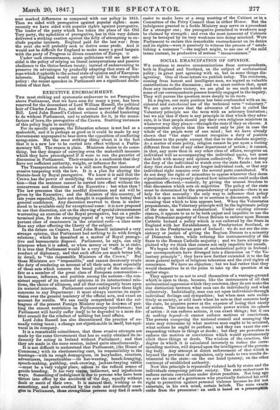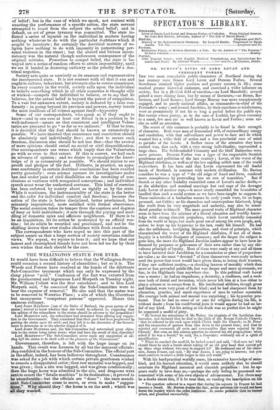SOCIAL EMANCIPATION OF OPINION.
WE continue to receive communications from correspondents, both in England and Scotland, on the subject of ecclesiastical polity ; in great part agreeing with us, but in some things dis- agreeing. One of these letters we publish today. The strictures, coming from honest and intelligent men, we regard as valuable contributions to the discussion ; and we must confess that, apart from any immediate victory, we are glad to see such minds as some of our correspondents possess heartily engaged in the inquiry. They will pursue the question more deeply to its roots.
In a degree, our main position has been confounded with an in-
cidental and untechnical use of the technical term " voluntary." We are quite aware that the advocates of what is called the Voluntary principle use the term with an arbitrary limitation ; but we say that if there is any principle in that which they advo- cate, it is that people should pay their own religious ministers in whatever way they please—through the state if they so choose. A correspondent objects that this would only be just in case the whole of the people were of one mind ; but we have already shown that "the state" cannot recognize a duty of positive obedience to the people except that due to the absolute majority. As a matter of state polity, religion cannot be put upon a footing different from that of any other department of action ; it cannot, in that, any more than in any other class of affairs, recognize an individual will as accompanying. the individual quota, but must deal both with money and opinion collectively. We do not deny the duty of the individual to watch over the state funds; • but we deny that state funds are any longer individual cash, or that any individual right remains over the several parts contributed. We do not deny the right of minorities to oppose whatever they deem objectionable; we expressly showed how minorities could make that opposition effectual,—namely, by giving the utmost freedom to that discussion which acts on majorities. The policy of the state must be determined by the preponderancy of opinion—there is no help for that necessity : the only way to influence that policy which is open to individuals or to sections is discussion, each ad- vocating that which to him appears best. When the Voluntaries preponderate, the Voluntary principle will be the legitimate policy of the state in matters ecclesiastical. Under existing circum- stances, it appears to us to be both unjust and impolitic to use the alien Protestant majority of Great Britain to enforce upon Roman Catholic Ireland a policy which is not enforced by the State in England with her Establishment, in Presbyterian Scotland, or even in the Presbyterian part of Ireland : we do not see the con- sistency or justice of giving the Regium Donum to a minority of Dissenters there, while refusing the instrumentality of the State to the Roman Catholic majority ; and we have already ex- plained why we think that course not only impolitic but unsafe.
We began with the question of ecclesiastical polity in Ireland: our correspondents have diverged into a discussion on "the Vo- luntary principle"; they have now further extended it to the far more general subject of religious toleration and the civil rights of conscience. We have no objection ; but we had rather that they would themselves be at the pains to take up the question at an earlier stage. They appear to us not to avail themselves of a vantage-ground
which is open to them, because, like the instruments of all that ecclesiastical oppression which they condemn, they do not make the due distinction between what man can do individually and what collectively. Individually, man can act upon individuals through individual feelings and sympathies; but when man acts collec- tively as society, or still more when he acts as that concrete body the state, he acquires power at the expense of losing that nicety of action. The state has an irresistible power within its sphere of action : it can enforce actions, it can exact things; but it can do nothing beyond—it cannot enforce motives or convictions. The persons composing the national council and managing the state may determine by what motives man ought to be actuated,
what actions he ought to perform ; and they can exact the cor-
responding tribute in things or deeds ; but they are powerless to enforce the motives or convictions which would spontaneously elicit those things or deeds. The wisdom of the exaction, the degree in which it is calculated inversely to induce the corre- sponding motives, will depend upon the intelligence of the govern- ing body. Any attempt at direct enforcement of that which is beyond the province of compulsion, only tends to two results de- trimental to the state—on the one hand tyranny, on the other contempt of established authority.
Now this principle is repeatedly violated both by states and the
individuals composing private society. The state endeavours to enforce certain convictions under divers penalties. Not long ago we saw the case of a gentleman who practically forfeited his civil right to protection against personal violence because he did not entertain, in his own mind, certain beliefs. The state exacts oaths from the prosecutor: an oath is based on a presumptiini of belief; but in the case of which we speak, not content with exacting the performance of a specific action, the state servant attempted to exact from the subject the actual belief; and in default, an act of gross tyranny was committed. The state in- flicted a series of injuries on the individual in matters having nothing whatever to do with the particular doctrines which it sought to inculcate ; for certainly the doctrinal matters of re- ligion have nothing to do with impunity in perpetrating per- sonal violence in the street ; but the absurd and vicious incon- sistency was the natural though unforeseen consequence of the original mistake. Powerless to compel belief, the state is be- trayed into a series of random efforts to attain impossibility, until we see it landed in decreeing outlawry as the penalty for a doc- trinal negation. Society acts quite as unwisely as its creature and representative the incorporated state. It is not content with all that it can and ought to enforce, behaviour, but attempts also to coerce conscience. ' In every country in the world, society calls upon the individual to believe something which in all other countries is thought silly or wicked—compels the individual to believe, or to say that he believes, for the actual belief is beyond the power of compulsion. To a vast but unknown extent, society is defeated by a false con- formity : in going beyond its province and powers, society breeds the most insidious of all crimes against itself—hypocrisy. Some of our correspondents, who speak as if they ought to know—and in one case at least our friend is in a position to be well-informed—assure us that consistent and intelligent Volun- taries are prepared to go " as far as we indicate." If that be true, it is desirable that the fact should be known as extensively as possible. We have insisted that conscience and conviction should be absolutely and individually free ; and that to secure such freedom, discussion also should be not less free—that the avowal of mere opinions should entail no social or civil disqualification. Our correspondents use terms which imply that the Voluntaries go with us even to that extent. If this is correct, we hail such an advance of opinion ; and we desire to promulgate the know- ledge of it as extensively as possible. We should rejoice to see proofs and pledges of the fact. Hitherto, in practice, an appa- rent conformity in certain doctrinal conclusions has been exacted pretty generally : even science pursues its investigations under ban and under pain of civil disabilities on the recording of con- clusions at variance with recognized conceptions ; and individual speech must wear the authorized costume. This kind of coercion has been enforced by society about as rigidly as by the state. While it continues, the instrumentality of the state is the better and the safer for individual comfort and freedom; because the action of the state is better disciplined, better proclaimed, less minutely inquisitorial, more satisfied with formal observance. The social coercion takes its temper from the caprices and dogmas of busy or bold individuals ; it acts through the prying and med- .dling of domestic spies and officious neighbours. If there is to be an inquisition, let its action he moderated by an official rou- tine ; let its edicts be recorded and proclaimed, and not be the shifting decree that ever eludes obedience with fresh exaction.
The correspondents who have urged us into this part of the subject assure us that a large section of society entertains similar views. We repeat, we rejoice to hear it ; and we hope that our -honest and clearsighted friends have not been led too far by their own wishes that such should be the case.



























 Previous page
Previous page